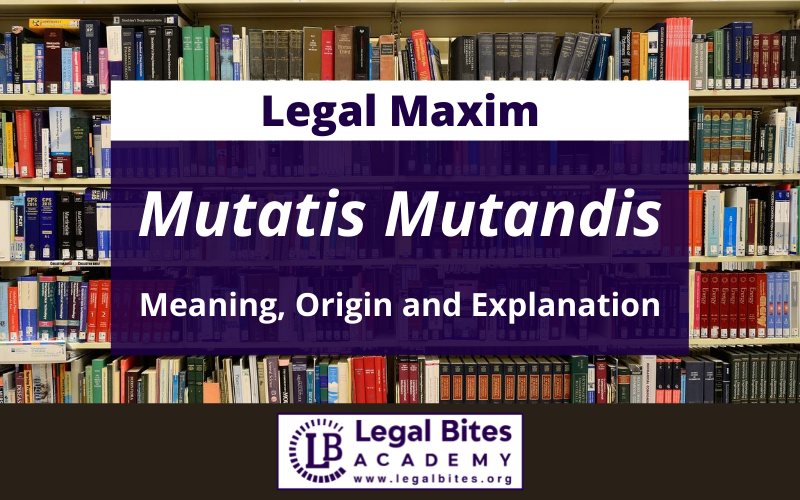Mutatis Mutandis: Origin, Meaning and Explanation
This article titled ‘Mutatis Mutandis: Origin, Meaning and Explanation’ is written by Sahajpreet Bhusari and discusses the legal maxim of Mutatis Mutandis. I. Origin and Meaning Mutatis Mutandis is a legal maxim of Latin origin. In Latin, the term literally means ‘with necessary changes having been made’.[1] II. Explanation The maxim refers to the necessary alterations that have been… Read More »

This article titled ‘Mutatis Mutandis: Origin, Meaning and Explanation’ is written by Sahajpreet Bhusari and discusses the legal maxim of Mutatis Mutandis. I. Origin and Meaning Mutatis Mutandis is a legal maxim of Latin origin. In Latin, the term literally means ‘with necessary changes having been made’.[1] II. Explanation The maxim refers to the necessary alterations that have been made or the differences that have been taken into account. In basic words, the maxim refers...
This article titled ‘Mutatis Mutandis: Origin, Meaning and Explanation’ is written by Sahajpreet Bhusari and discusses the legal maxim of Mutatis Mutandis.
I. Origin and Meaning
Mutatis Mutandis is a legal maxim of Latin origin. In Latin, the term literally means ‘with necessary changes having been made’.[1]
II. Explanation
The maxim refers to the necessary alterations that have been made or the differences that have been taken into account. In basic words, the maxim refers to the use of new terms or the need for appropriate changes to be made in similar statements. The term refers to things that are normally the same yet can be changed depending on the situation. Changes in comparable statements will be made to specific details such as the parties’ names, titles, and addresses.
III. Application
Mutatis Mutandis is an Indian legal adage that means “the essential alterations are being made; with necessary changes.” When applying or extending legislative laws to the same or comparable conditions of the same or similar subjects, the phrase is frequently used in legislation.
It’s nothing more than an adaption rule. (Debi Mata v. State of W.B., AIR 1972 Cal. 497) It entails making the appropriate changes in terms of specifics. (Bhutnath Das v. State of W.B., AIR 1964 Cal. 552) It is an adverbial phrase that qualifies the verb ‘shall apply’ and necessitates ‘those adjustments that must be made’ whenever it is used. (See also CIT v. T.P. Asrani [1980] 122 ITR 735 and Corporation of Calcutta v. Sirajuddin AIR 1957 Cal. 399.
IV. Case Laws
“When a law directs that a provision made for a certain type of case shall apply mutatis mutandis in another type of case, it means that it shall apply with such changes as may be necessary, but not that even if no change be necessary, some change shall be made, the Calcutta High Court held in Corporation of Calcutta v. Sirajuddin & Ors[2].
The Supreme Court of India held in Vasudev Anant Kulkarni v. Executive Engineer[3] that “the words ‘mutatis mutandis’ means with the appropriate alterations being made.” To put it another way, some modifications must be made, because mutatis mutandis does not indicate ‘with such changes as may be necessary,’ but rather ‘with the necessary adjustments being made.’
The meaning of the expression ‘mutatis mutandis’ was discussed in Ashok Service Center & Ors. v. State of Orissa[4], and it was concluded that the extension of an earlier Act mutatis mutandis to a later Act brings in the idea of adaptation, but only to the extent that it is necessary for the purpose, making a change without changing the essential nature of the thing changed, subject to express provisions made in the later Act.
References
[1] Mutatis Mutandis, Available Here.
[2] AIR 1957 Cal 399.
[3] 1995 ACJ 97.
[4] 1983 AIR 394.


